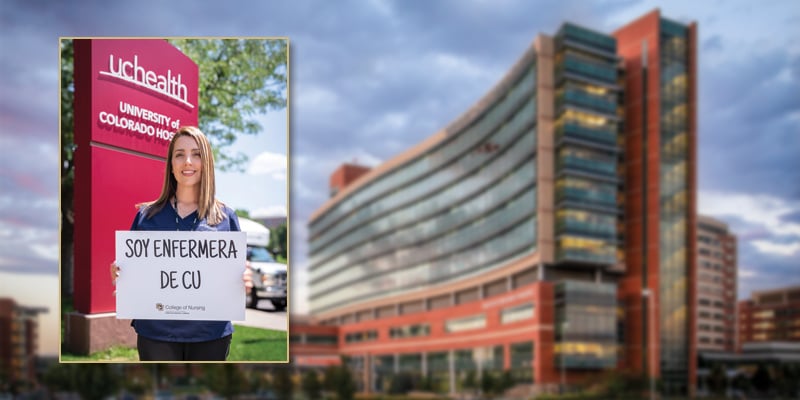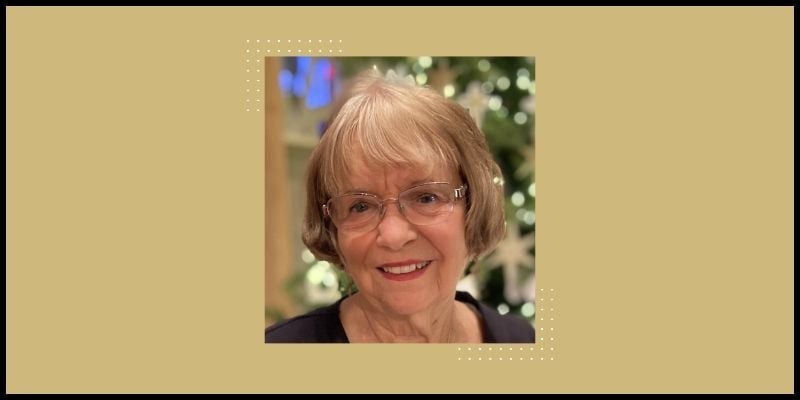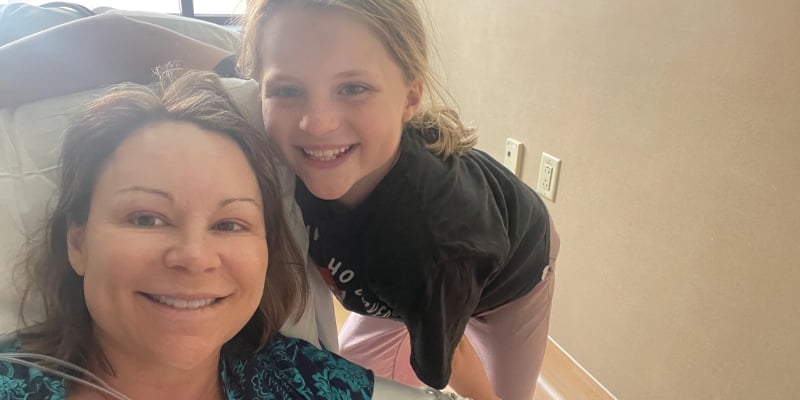Gladiz Martinez, AG-CNS, ‘20 BS ’08, acknowledges bedside nursing can be challenging. The hours and shifts are long, potentially causing burnout.
Those factors were heightened during the COVID-19 pandemic, causing a lot of nurses to question their careers.
Martinez was one of those nurses. She graduated in 2020 with an MS in Nursing through the University of Colorado College of Nursing at Anschutz Medical Campus’s Adult Gerontology-Clinical Nurse Specialist program.
She wasn’t sure what to do with her degree – but she found something unexpected. And it put her on a new career path.
“What I found was a new light, a new passion, and a new joy,” she says.
Transitioning to a Different Role
Martinez works at UCHealth’s Transplant Center in the Hispanic Program. She started as the regional perioperative educator for UCHealth in the Denver Metro, onboarding new staff and new graduates. Then three years ago, she moved into transplant services.
Martinez’s role as a Health Equity Specialist allows her to help an underserved community. She works with non-English-speaking patients, educating them on multiple topics surrounding transplants. The Transplant Center focuses on solid organs – kidney (sometimes with the pancreas), liver, heart, and lungs – and all the information is in English. Martinez makes sure the information is translated accurately and gives patients resources in Spanish.
The Transplant Center has a culturally appropriate website teaching patients about transplants and offers other resources.
“I work with the transplant center and the hospital’s health literacy team to ensure all of the web pages and education material are properly translated,” she says. “I also make sure things are culturally appropriate.”
Martinez also helps create videos in Spanish for patients and their families and does community outreach to educate the public.
“My biggest focus is educating both patients and the community because a lot of people don’t know this is a possibility for them,” she says. “Anyone interested can have language-appropriate information, and we can tell them how to access our information.”
Becoming a Nurse and Patient Educator
The first year of nursing is a lot of education. Nurses progress from beginners to experts during their careers. New graduates at UCHealth start as Level I nurses and move to Level II after completing orientation. Further levels depend on education, experience, and certification. Martinez mentions that a few years into her career, she sought growth and achieved Level III status.
She was credentialed through UEXCEL, UCHealth’s clinical recognition and advancement program. The program allows nurses to develop leadership skills while continuing to treat patients.

Martinez was featured in UCHealth's Nursing Year in Review. She was one of several nurses highlighted in the publication and was honored for her work in making a difference in patient outcomes. |
“My project was focused on language barriers and how we can improve the care of our patients in my surgical unit by having appropriate interpreter services,” she says. “It was about creating an awareness. Often, data shows that patients who don’t speak the same language receive less or suboptimal care than those who speak the same language. My goal was to increase that awareness.”
Martinez’s project worked – she found that nurses could use phones in a patient’s room to call an interpreter and put the interpreter on speaker phone, allowing them to talk to the patient.
“We found that when patients were waking up from surgery, they were still sedated to hold a phone next to their ear,” she says. “If we put the phone on speaker, they could hear the interpreter in Spanish or whatever language they spoke. I applied my project to the post-op unit, and it worked.”
Martinez realized she loved learning and implementing the new initiatives from educators, including new protocols, technology, and onboarding nurses. During her time in the post-anesthesia care unit, she also implemented a skin tear algorithm to treat skin tears caused by breathing tubes.
“As a bedside nurse, I could change the lives of the five or ten people I would take care of in a day. Being a nurse educator, I could help train more nurses to be just like me,” she says. “We could become super nurses and help everybody.”
The only problem – she didn’t know how to sustain changes. And she wanted to make sure she was implementing changes the right way.
“That's when I decided in addition to becoming an educator, how can I enhance my education to be a stronger mentor to nurses who see these problems at the bedside so that we can fix them together?”
CU Nursing’s AG-CNS curriculum includes a class specific to evidence-based practice. Students were required to engage and lead evidence-based practice and quality improvement initiatives to advance nursing practice. Those initiatives focus on improving patient and family outcomes and reducing healthcare costs.
A Nursing Leader
Martinez views educators as the experts in the unit they’re working in and says it’s an informal leadership role. She encourages nurses who want to get into education to build on their nursing knowledge and keep up to date with nursing practices.
“If you don’t have the experience, it’s hard to become the expert. It’s hard to teach somebody how to do something as simple as programming an IV pump. If you’ve never done it, you don’t know how to do it,” she says. “I feel that in every job I’ve done, whether it’s been a floor nurse, charge nurse, or regional educator, all my experiences have set me up for success."
Martinez says nurse educators don’t need to know everything, but building on critical thinking will help make them content experts.
“You can pass along your knowledge to other nurses,” she says. “You can explain how you troubleshoot something when things were going wrong, and you can tell nurses, ‘I’ve been there before, and I know what you’re going through’.”
Martinez says education comes into play no matter the nursing role – whether it’s discharging someone or talking to a group of patients in a community setting.
“Education is a big component of what nurses do,” she says. “You end up educating patients, whether it’s one-on-one or to multiple patients at a time. The beauty of nursing is you can do anything and everything. That’s what I found in my years as a nurse.”


